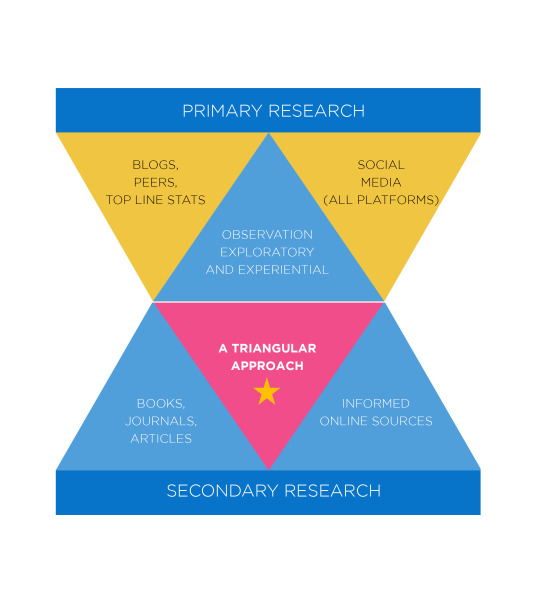#TriangularResearchApproach
Text
The importance of Research in creative practice:
Research is the process of looking into a certain topic, as well as closely related topics in order to get a better understanding of the subject matter you are working with.
In an article about Research as Creative Practice, Stancliff and Goggin (2015) argues that there are two metaphors when it comes to successful research - the geography of questions, and joining conversations. By applying these metaphors, students learn that research, and the writing that emerges from it, creates knowledge rather than just just demonstrate that they know something someone else created.
In-depth research can reveal strengths and weaknesses at an early stage of your work, and allow you to push into your findings on the right trajectory.
The Triangular Research Approach:

PRIMARY RESEARCH
In this first stage, the aim is to keep your research as wide as possible, looking into a wide variety of thoughts, theories and visual inspiration in order to gain a better understanding of where your interests lie.
At this stage, I am not to worried about the deeper facts and influences that might inspire my work, but rather the top-line info that attracts me.
SECONDARY RESEARCH
In the second phase it is time to start critically evaluating your thoughts and notes to identify where the potential areas of further investigation lies by identifying more in-depth sources to gain better understanding of your topics.
It is also the phase where you start eliminating thoughts and ideas that seemed interesting in phase 1, but no longer supports where you are wanting to go with your work.
ACHIEVING A TRIANGULAR RESEARCH APPROACH
By pushing into your findings from phase 1 and 2, you are able to come up with a body of research that is focused while checking all the important boxes and aims to achieve your research goals.
Questions will start to arise, allowing you to gain new insights and findings that you can only achieve when truly understanding the subject matter you are working with, and what your thoughts, opinions and theories are coming out of the process.
Sources:
STANCLIFF, M. and GOGGIN, M.D., 2015. Research as Creative Practice: Two Metaphors for Teaching and Learning. English Journal, 105(2), pp. 27-33.
0 notes